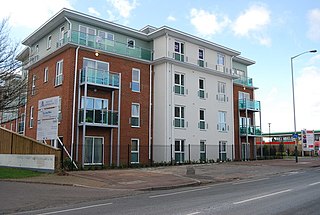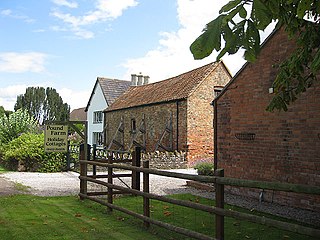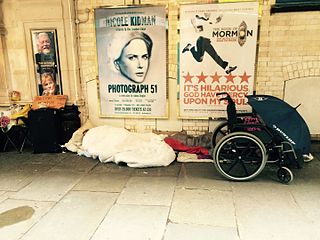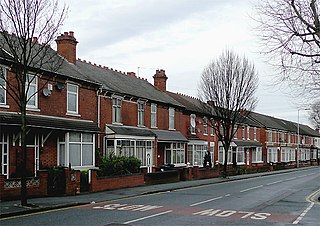
Council Tax is a local taxation system used in England, Scotland and Wales. It is a tax on domestic property, which was introduced in 1993 by the Local Government Finance Act 1992, replacing the short-lived Community Charge, which in turn replaced the domestic rates. Each property is assigned one of eight bands in England and Scotland, or nine bands in Wales, based on property value, and the tax is set as a fixed amount for each band. The more valuable the property, the higher the tax, except for properties valued above £320,000. Some property is exempt from the tax, and some people are exempt from the tax, while some get a discount.

In Ireland and the United Kingdom, housing associations are private, non-profit making organisations that provide low-cost "social housing" for people in need of a home. Any budget surplus is used to maintain existing housing and to help finance new homes and it cannot be used for personal benefit of directors or shareholders. Although independent, they are regulated by the state and commonly receive public funding. They are now the United Kingdom's major providers of new housing for rent, while many also run shared ownership schemes to help those who cannot afford to buy a home outright.

A landlord is the owner of a house, apartment, condominium, land, or real estate which is rented or leased to an individual or business, who is called a tenant. When a juristic person is in this position, the term landlord is used. Other terms include lessor and owner. The term landlady may be used for the female owners. The manager of a pub in the United Kingdom, strictly speaking a licensed victualler, is referred to as the landlord/landlady.

The fathers' rights movement in the United Kingdom consists of a large number of diverse pressure groups, ranging from charities and self-help groups to civil disobedience activists in the United Kingdom, who started to obtain wide publicity in 2003. Studies show the majority of the UK population support the need for change and protection of fathers rights to meet the responsibility through 50:50 contact. The movement's origin can be traced to 1974 when Families Need Fathers (FNF) was founded. At the local level, many activists spend much time providing support for newly separated fathers, most of whom are highly distraught. Although some have been accused of being sexist by some commentators, these groups also campaign for better treatment for excluded mothers, women in second marriages, other step-parents and grandparents - all of whom suffer discrimination in respect of contact with their (grand) child(ren).

A charitable organization or charity is an organization whose primary objectives are philanthropy and social well-being.
Property management is the operation, control, maintenance, and oversight of real estate and physical property. This can include residential, commercial, and land real estate. Management indicates the need of real estate to be cared for and monitored, with accountability for and attention to its useful life and condition considered. This is much akin to the role of management in any business.

A holiday cottage, holiday home, or vacation property is accommodation used for holiday vacations, corporate travel, and temporary housing often for less than 30 days. Such properties are typically small homes, such as cottages, that travelers can rent and enjoy as if it were their own home for the duration of their stay. The properties may be owned by those using them for a vacation, in which case the term second home applies; or may be rented out to holidaymakers through an agency.
The Right to Buy scheme is a policy in the United Kingdom which gives secure tenants of councils and some housing associations the legal right to buy, at a large discount, the council house they are living in. There is also a Right to Acquire for assured tenants of housing association dwellings built with public subsidy after 1997, at a smaller discount. By 1997 over 1,700,000 dwellings in the UK had been sold under the scheme since its introduction in 1980, with the scheme being cited as one of the major factors in the drastic reduction in the amount of social housing in the UK, which has fallen from nearly 6.5 million units in 1979 to roughly 2 million units in 2017, while also being credited as the main driver of the 15% rise in home ownership, which rose from 55% of householders in 1979 to a peak of 71% in 2003.

Community benefit societies were historically known as industrial and provident societies (IPS) which are legal entities for a trading business or voluntary organisation in the United Kingdom, the Republic of Ireland, and New Zealand. The name is still used in New Zealand, the Republic of Ireland and within the UK in Northern Ireland.
Under Part 5 of the Housing Act 2004 a Home Information Pack, sometimes called a Seller's Pack, was to be provided before a property in England and Wales could be put on the open market for sale with vacant possession. There is separate legislation for Scotland that requires anyone selling a property to provide a Home Report. The pack was a set of documents about the property: an Energy Performance Certificate, local authority searches, title documents, guarantees, etc. The introduction of HIPs was subject to delays and reduced requirements, but they became mandatory for homes with four or more bedrooms on 1 August 2007 and were extended to three-bedroomed properties from 10 September 2007.
Laws regulating nonprofit organizations, nonprofit corporations, non-governmental organizations, and voluntary associations vary in different jurisdictions.

Public housing in Australia is provided by departments of state governments. Australian public housing operates within the framework of the Commonwealth-State Housing Agreement, by which funding for public housing is provided by both federal and state governments. According to the 2006 census, Australia's public housing stock consisted of some 304,000 dwellings out of a total housing stock of more than 7.1 million dwellings, or 4.2% of all housing stock.

Homelessness in the United Kingdom is measured and responded to in differing ways in England, in Scotland, Wales and Northern Ireland but affects people living in all areas of the countries.

Anchor was England’s largest not-for-profit provider of housing, care and support to people over 55 years old up until November 2018 when Anchor merged with Hanover Housing Association to form Anchor Hanover Group, the largest provider of specialist housing and care for older people in England.

Empty dwelling management orders (EDMOs) are a legal device used in England and Wales, which enable local authorities to put an unoccupied property back into use as housing. EDMOs were created by the Housing Act 2004, with the relevant legislation coming into effect in mid-2006; in the three and a half years to the end of 2010, however, only 43 had been issued.
Canopy Housing is a self-help, community housing charity working in inner city Leeds, West Yorkshire, UK. The organisation renovates derelict houses to create decent homes for people who are homeless. A new tenant paints, decorates and furnishes their new home alongside Canopy staff and volunteers.

A council house is a form of British public housing built by local authorities. A council estate is a building complex containing a number of council houses and other amenities like schools and shops. Construction took place mainly from 1919 after the Housing Act 1919 to the 1980s, with much less council housing built since then. There were local design variations, but they all adhered to local authority building standards. The Housing Acts of 1985 and 1988 facilitated the transfer of council housing to not-for-profit housing associations with access to private finance, and these new housing associations became the providers of most new public-sector housing. By 2003, 36.5% of the social rented housing stock was held by housing associations.

Housing in the United Kingdom represents the largest non-financial asset class in the UK; its overall net value passed the £5 trillion mark in 2014. About 30% of homes are owned outright by their occupants, and a further 40% are owner-occupied on a mortgage. About 18% are social housing of some kind, and the remaining 12% are privately rented.

The Housing and Planning Act 2016 is Act of Parliament in the United Kingdom that makes widespread changes to housing policy and the planning system. It introduces legislation to allow the sale of higher value local authority homes, introduce starter homes and "Pay to Stay" and other measures intended to promote home ownership and boost levels of housebuilding. The Act has been subject to a number of criticisms by those opposed to the loss of social housing promoted, the extension of right-to-buy to housing associations and possible work disincentives under "Pay to Stay".

Affordable housing is housing which is deemed affordable to those with a median household income as rated by the national government or a local government by a recognized housing affordability index. The challenges of promoting affordable housing varies by location.













